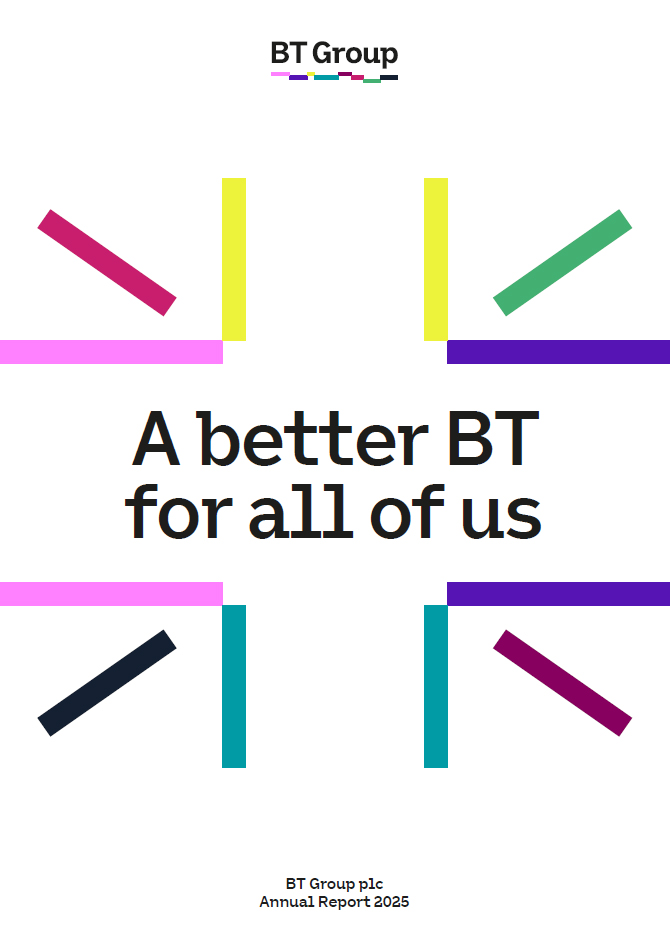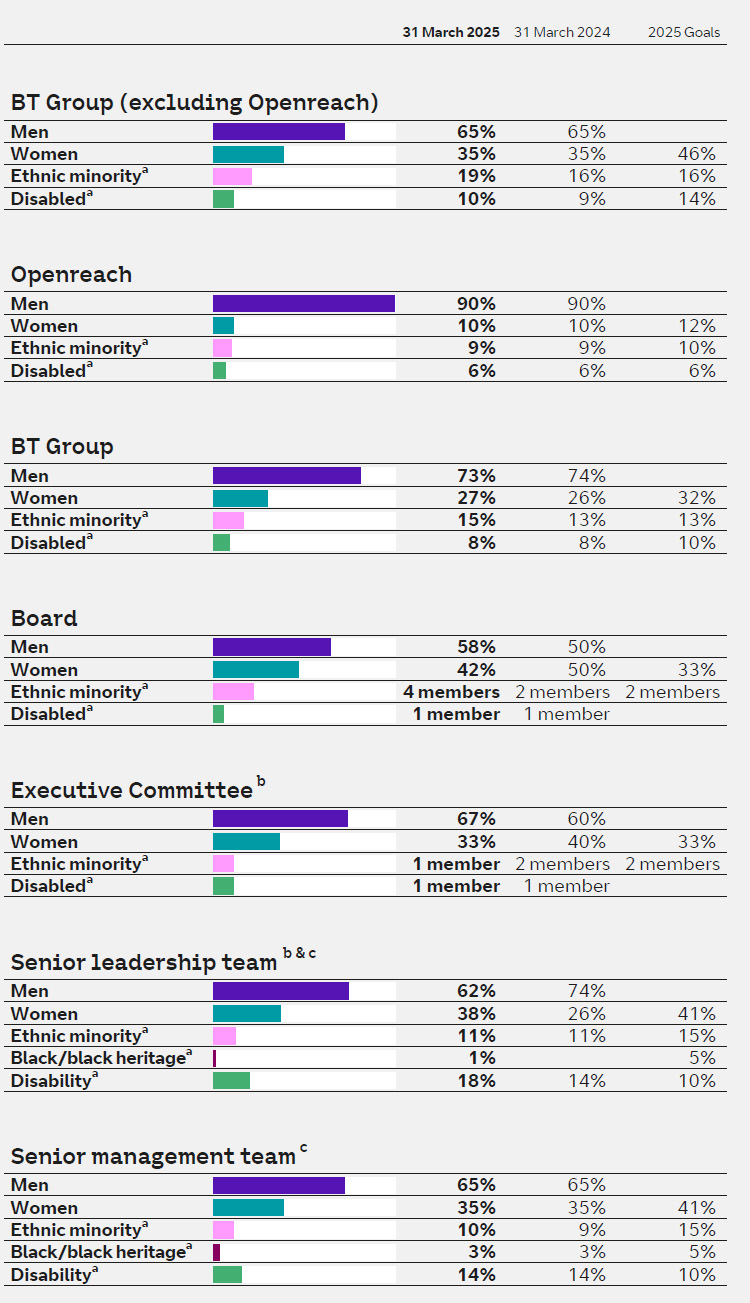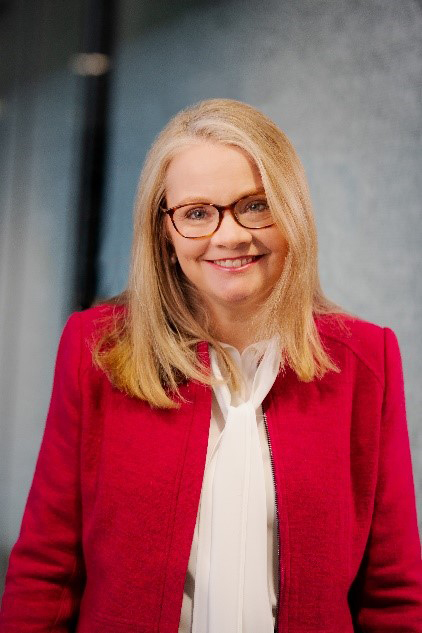Having a workforce that reflects our customers is mission critical for BT Group to ensure our products and services are accessible and inclusive by design.
Whether it’s in our EE stores, our contact centres, connecting customers in their homes, or making decisions about products and services in meetings – we must understand the experience and needs of our customers to meet the expectations of all our stakeholders.
Inclusion by design is the key to our strategy and will help us drive productivity, innovation and growth for the UK and beyond. BT Group is modernising to be the most trusted connector of people, devices and machines. In parallel we are taking action to modernise our workplaces for contemporary societal structures.
In December 2024, we renewed our disability and neurodiversity ambitions for our customers, our people, and our communities.
For our customers
We’re creating personal, inclusive and barrier-free customer journeys with brilliant, simple products accessible by design.
For our people
We’re ensuring colleagues feel safe and valued through brilliant, simple processes and personal experiences like digital environments and Better Workplace buildings.
For our communities
We’re making it simple for disabled-led businesses to work with us and thrive by creating opportunities and closing the digital divide.
In August 2025, we set out our LGBTQ+ inclusion ambitions - shaped by feedback from our people and communities, and strengthening our commitment to our customers, our colleagues, and the communities we serve.
For our customers
We’re creating personal, inclusive and positive experiences for our LGBTQ+ customers, with seamless journeys that reflect and respect who they are.
For our people
We’re building an inclusive organisation for all our people and ensuring our LGBTQ+ people feel safe and valued, whether they work in an office, on the High Street, or out in the field.
For our communities
We’re building meaningful connections with LGBTQ+ communities and businesses, nurturing trust in BT, our products, services and people. We’re also proud to support charities such as Switchboard and FFLAG.


Along with our financial reports, our 2025 Annual Report contains a summary of the initiatives we delivered in FY25 (2025 Financial Year) to build a diverse and inclusive BT Group. The report also highlights our eighth Gender pay gap report, fifth voluntary Ethnicity pay gap report, and second Disability pay gap report, and the progress we have made so far towards achieving more balanced representation in relation to women, ethnic minority colleagues and disabled colleagues.
-
BT Group plc - Annual Report 2025
pdf - 20.59 MB
We want our workforce to reflect our customers, so that our products and services meet the needs of all our customers.
This table shows the progress we have made to improve our representation of women, ethnic minority and disability representation at various levels of the organisation.


We collect diversity data for protected characteristics (in line with UK employment law) and special category data (in line with GDPR and other local laws). Our colleagues do this voluntarily – direct into our HR system.
We store, use and report on data in line with local laws and our advertised employee privacy notices. Due to local restrictions on recording and reporting ethnicity and disability, the information opposite is UK only.
a UK population only.
b For the purpose of the UK Corporate Governance Code 2018, our leadership comprises the Executive Committee (excluding Executive Directors on the Board but including the CEO, Openreach) and all Executive Committee direct reports (excluding admin roles). This totals 32 women (41%) and 47 men (59%).
c For the purposes of the Companies Act 2006, our senior management comprises those employees responsible for planning, directing and controlling the activities of the group, or a strategically important part of it (members of our senior leadership and senior management teams, and directors of the group’s subsidiaries but excluding directors on the Board). This totals 251 women (38%) and 416 men (62%). Numbers presented include 104 subsidiary directors (75 men and 29 women) who are not otherwise members of our leadership or senior management teams.
Ambitions into actions
-
My role and how we work is flexible
We’re hard-wiring inclusion and flexibility into the way we design roles at BT Group through flexible ways of working that support colleagues at various stages of life to grow a career with us.
-
I’m safe and respected at work
We’re taking steps to prevent harm, discrimination and microaggressions and creating safe and trusted spaces that colleagues can go if they need support.
-
I’m treated fairly in hiring, performance and promotion processes
We’re looking at all the barriers of an individual joining BT Group, performing to the best of their abilities, accessing inclusive policies and development that enables them to progress their career.
We’re making sure that every single manager across BT Group knows what it means to be inclusive. Managers are upskilled and held accountable to remove existing barriers and to take different approaches to address barriers experienced by our colleagues.
-
My work environment and tools are accessible and inclusive
We’re focusing on making reasonable physical, environmental and system workplace adjustments to enable our people to do their best work.
-
My manager and our leaders are inclusive
Making sure that every single manager across BT Group knows what it means to be inclusive, upskilling to make sure different approaches can be used to address barriers and held accountable to take committed action to remove existing barriers.
Working Inclusively across BT Group involves everybody, from our leaders, all colleagues and our external partners.
We believe everyone has a role to play in making BT Group more inclusive for our customers and our colleagues.
Our Inclusion team oversees our overarching approach, strategy and portfolio, reporting to the Executive Committee and updating the Board on our strategy, and progress against our targets.
BT Group maintains a very active set of award-winning colleague-driven people networks who champion members’ concerns and are sponsored by senior leaders, playing a key role in ensuring we maintain an intersectional lens as we work to achieve our Inclusion ambitions.
- Able 2 – Supporting Disability
- Ethnic Diversity Network
- Gender Equality Network
- Pride – Supporting LGBTQ+
- Carers Network
- Peer to Peer – Offering a listening ear
- Armed Forces Network
- Christian Network
- Hindu Network
- Jewish Network
- Muslim Network
- Sikh Network
We also partner with external organisations to ensure that we are aligned with external best practice. These include Stonewall, Investing in Ethnicity, the British Disability Forum, Carers UK and The Social Mobility Foundation.
Our pay gaps


The overall BT Group UK gender pay gap figures, which captures all entities within scope, has narrowed to 2.6% at mean and 4.8% at median, versus 4.0% and 5.6% in 2023 respectively.
While both the median and mean figures continue to sit below the telecommunications industry averages, we are not complacent and we are doing more to attract, recruit and retain women in order to achieve balanced gender representation at all levels across the business.
-
Gender pay gap statement 2024 (pdf - 144 KB)
Although UK organisations are not legally required to publish their ethnicity pay gap, as part of our overall commitment to I&D, we have published our fifth Ethnicity pay gap (EPG) figures.
In 2024, the overall mean pay gap shifted to 0.5%, changing from -0.8% in favour of minority groups in 2023. The median pay gap has narrowed by 1.7% and now sits at -0.1% where it was -1.8% in 2023.
Like last year, we have examined our UK EPG data in more granular detail. This is because we recognise that a binary ethnicity pay gap can mask the disparate issues that people from different ethnic groups face at work and in wider society. Examining the data at a more granular level provides a more nuanced picture:
-2.2%
mean
( 2023: -3.4% )
-2.2%
median
( 2023: -2.9% )
8.2%
mean
( 2023: 5.1% )
2.1%
median
( 2023: -0.9% )
-1.1%
mean
( 2023: 0.1% )
2.4%
median
( 2023: 4.0% )
-3.9%
mean
( 2023: -3.7% )
-6.2%
median
( 2023: -8.7% )
To address our current ethnicity pay gap, and improve ethnic diversity across BT Group, we are delivering a number of initiatives to attract, recruit and retain more people from ethnic minority backgrounds.
The disclosure rate for disability status has improved this year to 74% from 68% in the previous year’s reporting. This has also impacted the year-on-year movement in the pay gap results.
The mean and median pay gaps for those employees that disclosed, are showing positively with a small mean gap of 0.5% and a -0.3% median gap.
These do differ within the four reporting entities with the mean gap for BT plc at 3.8% and EE Ltd at 4.3%. Openreach and Plusnet have a negative gap at -4.7% and -1.4% respectively, which brings the overall mean gap down to the 0.5% at group level.



